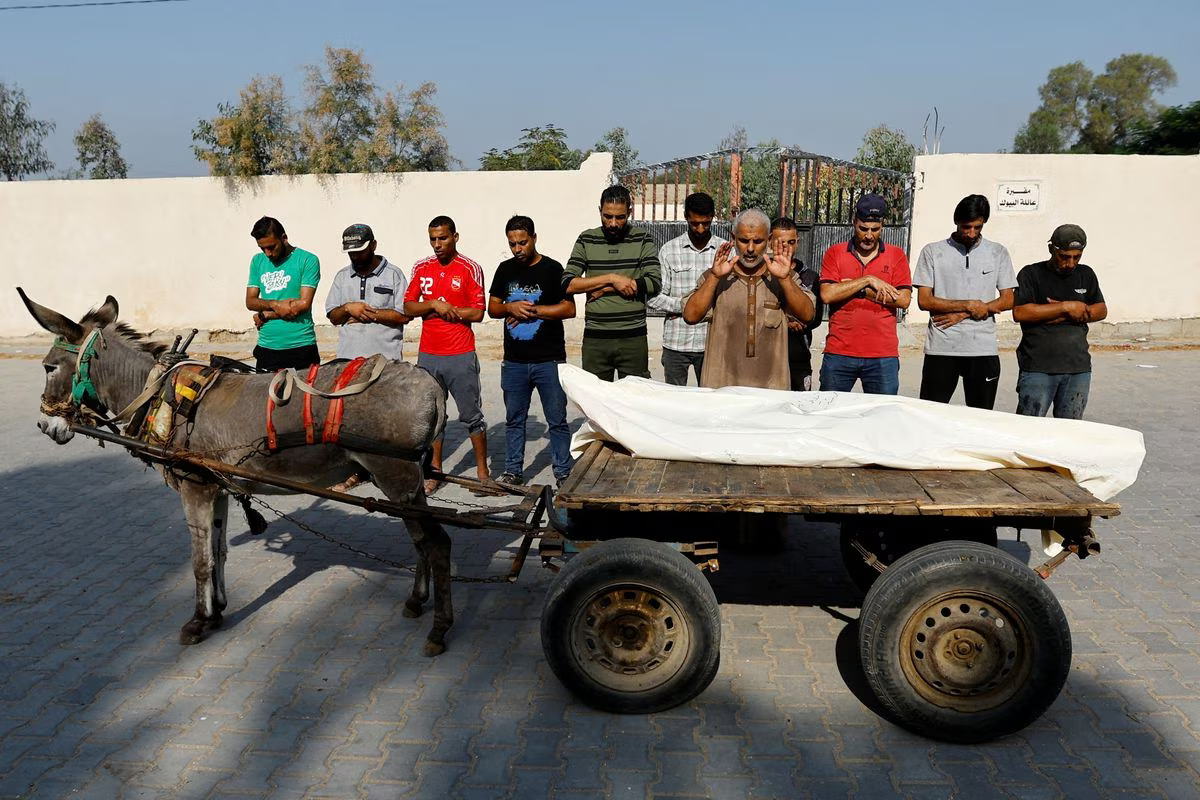
People pray during the funeral of a Palestinian man killed in Israeli strikes whose body is being transported on a donkey-drawn cart, amid shortages of fuel, in Khan Younis, in the southern Gaza Strip, October 25. REUTERS/Ibraheem Abu Mustafa
GAZA STRIP, Palestinian Territories — A United Nations agency warned dwindling fuel supplies could force it to stop aid operations in war-riven Gaza on Wednesday, as calls mounted for a humanitarian “pause” in fighting.
After 18 days of withering Israeli airstrikes and a near-total land, sea and air blockade of the Palestinian territory, the UN agency for Palestinian refugees warned operations were at breaking point.
“If we do not get fuel urgently, we will be forced to halt our operations in the Gaza Strip,” said the UN agency, which provides aid to 600,000 displaced Gazans.
Israel launched its assault on Gaza in response to an unprecedented cross-border attack by Hamas militants on Oct. 7.
Growing unease
Gunmen from the Palestinian group poured into Israel from Gaza, killing more than 1,400 people and taking 222 hostages, according to Israeli authorities.
Israeli Prime Minister Benjamin Netanyahu has promised to “eliminate Hamas” and ensure it can no longer threaten Israeli civilians.
But there is growing international unease about the impact of Israel’s “Operation Swords of Iron.”
Gaza’s Hamas-run health ministry says 5,791 people have been killed in the war so far, many of them children.
The ministry put Tuesday’s toll at more than 700 people, with the UN saying it was the highest reported in a single day since the war began.
Overnight, at least 80 people were killed, the Hamas government said on Wednesday.
Agence France-Presse (AFP) has not been able to independently verify these figures.
Aid agencies report hospitals are overwhelmed, generators lack fuel and shelters are heaving under the weight of an estimated 1.4 million displaced—more than half the population.
Since the war began, a few dozen trucks with essential supplies have been allowed to cross the Egyptian border into Gaza, far fewer than needed, according to aid agencies.
‘Epic suffering’
The Palestine Red Crescent said on Tuesday it had received the fourth batch of humanitarian aid, consisting of eight trucks.
The supplies have included medicines, food and water, but not fuel, which Israel fears could end up in Hamas’ hands.
UN Secretary General Antonio Guterres said Gaza was now seeing “epic suffering,” while imploring Israel to safeguard civilians.
“The relentless bombardment of Gaza by Israeli forces, the level of civilian casualties and the wholesale destruction of neighborhoods continue to mount and are deeply alarming,” he told the UN Security Council in New York. “I am deeply concerned about the clear violations of international humanitarian law that we are witnessing in Gaza,” he said.
That warning drew an angry response from Israeli Foreign Minister Eli Cohen, who cited the graphic ways in which Israeli civilians had been killed by Hamas, and demanded: “Mr. Secretary General, in what world do you live?”
No to blanket ceasefire
Israel and its allies have so far rebuffed calls for a blanket ceasefire, which the White House says would only benefit Hamas.
President Joe Biden has said a full ceasefire can only be considered if and when Hamas releases the more than 200 hostages it is holding in Gaza.
But US officials have since indicated that a more limited “humanitarian pause” in certain areas could help ease civilian suffering.
Secretary of State Antony Blinken said: “Food, water, medicine and other essential humanitarian assistance must be able to flow into Gaza.
“It means civilians must be able to get out of harm’s way. It means humanitarian pauses must be considered for these purposes.”
‘A lot of obstacles’
His comments came as Israel continued to mass tens of thousands of troops around Gaza ahead of an expected ground offensive.
That operation appears to have been stalled by concerns about objectives, the fate of hostages and civilians, and the difficulties of fighting in a densely populated area latticed by underground tunnels.
“There are a lot of obstacles,” an Israeli soldier serving with the military engineering corps told AFP on condition of anonymity.
“The enemy is spraying rockets and other things that I cannot detail to prevent us from progressing.”
So far Hamas has released only four hostages.
Throughout the war, Hamas has continued to launch rocket attacks and raids into Israel.